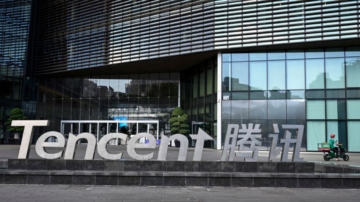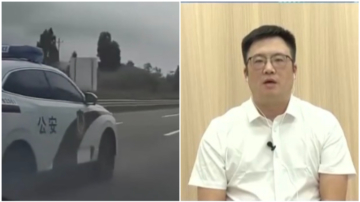【新唐人2013年11月23日讯】随着中共十八届三中全会的《决定》提出渐进式延迟退休政策,争论数年的延迟退休年龄这一问题,终于从“谣言”变为现实。大陆民众反对声浪加剧,质问养老金到底到哪里去了,并认为这是当局转嫁危机的手段﹔而有专家则批评这是当局企图“以毒攻毒”。
11月15号公布的十八届三中全会《决定》,全文明确提出五大有关社保的重大问题,其中,研究制定渐进式延迟退休年龄政策排在首位。
大陆媒体报导声称,有公开数据表明,退休年龄每延长一年,养老统筹基金可增长40亿元,减支160亿元,减缓基金缺口200亿元。
至此,难以服众的延迟退休年龄已成定局。这也是中共的重要文件第一次明确提及延迟退休年龄。消息引发外界强烈反弹。显然,延迟退休将缓解国家养老压力,但个人负担将增加。
中投顾问高级研究员任浩宁批评,延迟退休年限解决不了根本问题,这算是一个“以毒攻毒”的策略,社保亏空只能通过非常规手段逐渐填补,普通百姓的权益可能要“被平均”。
中国太平洋保险公司职员李学惠:“一句话,延迟养老的问题,就是我们的养老金到底到哪里去了?017全世界我们GDP第二嘛,我们不是能够拿出那么多钱援助国外吗?不拿出钱援助北韩原子弹吗?那我们的养老金到哪里去了?一句话,我们的钱到底是谁弄走了?”
面对诸多反对声音,中共人社部官员表示,延迟退休将设几年缓冲期,不能马上施行。
《新唐人》特约经济评论专家马杰森:“它的窟窿是极大极大的,绝对不可能是延迟退休就能把这个窟窿完全补上,这是绝对不可能的。这个窟窿主要造成的原因是中共在08年以来,在税收不断增长,国家财政收入不断增长的时候,它没有及时有效的建立养老金的储备,把钱大胆的花在像奥运这些面子工程上。”
据中国社科院世界社保研究中心发布的《中国养老金发展报告2012》显示,中国城镇基础养老保险个人账户空账额,2011年高达2.22万亿元。那么,养老金的巨额空帐要如何弥补呢?
有媒体计算,如果中国财政资金有30%用于社会保障资金,则每年可增加社保资金最少达3万亿以上。三中全会《决定》中声称,到2020年将国有资产收益的上缴比例提高到30%,将此款项用于保障民生
而中共人社部官员金维刚却对大陆媒体表示,全国社会保障基金与社会保险基金和养老保险基金属不同性质,目前还不会用来弥补基本养老保险基金缺口。
马杰森:“所有这些事情都体现了中共在过去几十年制度的方式。在它扔担子的时候,比如把养老金系统推向社会、把住房金系统推向社会的时候,它一步到位。但是当它有很多钱,承担该承担的义务的时候,却举步维艰。主要是因为它现有的体系、贪官体系运作效率极低,耗费极大。收上来多少钱,都被这个体系一下消耗掉,根本留不下甚么馀钱给老百姓。”
有报导说,延迟退休产生的最大负面影响是对年轻人的就业冲击。在中共号称经济增速高达10%的背景下,中国每年有大约1400万人找不到工作。有统计显示,中国每年有600万至700万人退休,加上目前中国经济增速已下滑到7%左右,就业岗位减少,再加上延迟退休,就可能使得就业岗位全部消失。
李学惠:“政治上老喊的好,全心全意为人民服务。我正常应该交的东西就交。我们不珍惜权利,把政治权力交给你(中共)了,你为非作歹,我们把养老金交给你了,你让我们延迟养老,这应该让我们更多民众反思。我们自己不珍惜自己的政治权力,我们变成让人任意宰割了。”
有民众表示,不管百姓反对,延迟退休就这么定了。不延迟退休不行了,因为养老金出现巨额缺口,而缺口的原因绝非劳动者少交了社保钱。终于知道,是谁动了我们的养老金!
采访/陈汉 编辑/王子琦 后制/黎安安
China Raises Retirement Age to Make up the Deficit
The third plenum of the Chinese Communist Party (CCP) has
decided that the retirement age delay policy will be
carried out gradually.
A much debated issue has finally turned into a reality.
While opposing the decision, the Chinese have also questioned
where has the pension gone.
Some believe the authorities are transferring
the crisis to the people.
Specialists criticizes that the authorities are tackling
the crisis with another crisis.
The third plenary decision published on 15th November outlined
five major issues concerning social security, of which
delaying the retirement age taking the front seat.
Publicly available data show the pension fund can grow
by 4 billion yuan ($656.5 million), save 16 billion yuan in
spending and decrease 20 billion yuan in fund shortages
if the retirement age is extended by a year,
reported a Chinese media.
The controversial retirement policy has finally set its tone.
This is the first time the CCP explicitly documented
its policy to raise the retirement age.
But it met strong opposition.
Obviously, this policy relays pension pressure
from the state to the Chinese people.
Ren Haoning is a researcher at an energy investment firm.
He does not believe raising the retirement age will solve
the fundamental problem.
It is a crisis to crisis strategy, an unconventional method
to gradually fill up the pension deficit at the expense of
the average working class.
Li Xuehui, staff of China Pacific Insurance Group: I have
only one question regarding, raising the retirement age.
Where has our pension gone?
Our GDP is claimed to be world number two.
We have so much money for foreign aid.
Did we not aid the North Korean nuclear plan?
So where has our pension gone?
One question. Who took our money?
Facing all the opposition, the Ministry of Human Resources
and Social Security responded that a buffer period will
follow before the policy is fully implemented.
Ma Jiesen, NTD TV economic correspondent: This deficit is
so huge that it is absolutely impossible to make it up by
simply delaying retirement.
The main reason for this huge deficit is that the CCP has
never set up an effective pension reserve since the growing
state revenue in 2008.
In stead, it spent money carelessly on face-saving projects
such as the Olympics.
China Pension Report (CPR) 2012, compiled by the Center
for International Social Security Studies at the Chinese
Academy of Social Sciences,
points out that the shortfall in the individual account
reached 2.22 trillion yuan ($355.9 billion) in 2011.
So, how can the huge gap in the nation’s pension be made up?
According to the media’s estimate, with 30% of state revenue
input, annual social security funds will increase by
at least three trillion.
The third plenary decision claimed that by 2020, 30% of
state revenue will turn into funds for livelihood.
Jin Weigang, the Head of the Social Security Research
Institute at the Ministry of Human Resources and Social
Security told the Chinese media
that the national social security fund
and the social insurance fund are of a different
nature from the pension funds.
Thus they will not be used to cover the deficit of
the basic pension insurance fund.
Ma Jiesen: Everything reflects how the CCP have operated
in the last decades.
They relay the burden onto society quickly, such as in
the cases of the pension system and the social housing system.
But it is very difficult for them to assume the obligations.
It is because of the low efficiency of the government.
The corruption has absorbed all the money.
There is not much left for the people.
There are reports saying that the younger generation will be
hit hardest from the raised retirement age.
While the CCP claimed its 10% economic growth,
there were on average 14 million people unemployed.
Statistics show 6 to 7 million retirees in China per year.
Now that China's economic growth is down to 7%,
with the job losses and the delayed retirement plan,
all available jobs could simply disappear.
Li Xuehui: Politically, they claim they
are wholeheartedly there for the people.
I pay what I am supposed to pay.
We give up our rights and hand over our political rights
to the CCP.
We paid for our retirement plan, but now
our retirement is delayed.
We really need to think about it.
Not cherishing our political rights, we have now
become the sacrifice.
It is said that in spite of the opposition, the retirement
decision has been made.
The decision is a must because of the huge deficit.
People have always paid what they are supposed to.
Now it is clear who took the pensions.
Interview / Chan Han Edit / Wang Ziqi
11月15号公布的十八届三中全会《决定》,全文明确提出五大有关社保的重大问题,其中,研究制定渐进式延迟退休年龄政策排在首位。
大陆媒体报导声称,有公开数据表明,退休年龄每延长一年,养老统筹基金可增长40亿元,减支160亿元,减缓基金缺口200亿元。
至此,难以服众的延迟退休年龄已成定局。这也是中共的重要文件第一次明确提及延迟退休年龄。消息引发外界强烈反弹。显然,延迟退休将缓解国家养老压力,但个人负担将增加。
中投顾问高级研究员任浩宁批评,延迟退休年限解决不了根本问题,这算是一个“以毒攻毒”的策略,社保亏空只能通过非常规手段逐渐填补,普通百姓的权益可能要“被平均”。
中国太平洋保险公司职员李学惠:“一句话,延迟养老的问题,就是我们的养老金到底到哪里去了?017全世界我们GDP第二嘛,我们不是能够拿出那么多钱援助国外吗?不拿出钱援助北韩原子弹吗?那我们的养老金到哪里去了?一句话,我们的钱到底是谁弄走了?”
面对诸多反对声音,中共人社部官员表示,延迟退休将设几年缓冲期,不能马上施行。
《新唐人》特约经济评论专家马杰森:“它的窟窿是极大极大的,绝对不可能是延迟退休就能把这个窟窿完全补上,这是绝对不可能的。这个窟窿主要造成的原因是中共在08年以来,在税收不断增长,国家财政收入不断增长的时候,它没有及时有效的建立养老金的储备,把钱大胆的花在像奥运这些面子工程上。”
据中国社科院世界社保研究中心发布的《中国养老金发展报告2012》显示,中国城镇基础养老保险个人账户空账额,2011年高达2.22万亿元。那么,养老金的巨额空帐要如何弥补呢?
有媒体计算,如果中国财政资金有30%用于社会保障资金,则每年可增加社保资金最少达3万亿以上。三中全会《决定》中声称,到2020年将国有资产收益的上缴比例提高到30%,将此款项用于保障民生
而中共人社部官员金维刚却对大陆媒体表示,全国社会保障基金与社会保险基金和养老保险基金属不同性质,目前还不会用来弥补基本养老保险基金缺口。
马杰森:“所有这些事情都体现了中共在过去几十年制度的方式。在它扔担子的时候,比如把养老金系统推向社会、把住房金系统推向社会的时候,它一步到位。但是当它有很多钱,承担该承担的义务的时候,却举步维艰。主要是因为它现有的体系、贪官体系运作效率极低,耗费极大。收上来多少钱,都被这个体系一下消耗掉,根本留不下甚么馀钱给老百姓。”
有报导说,延迟退休产生的最大负面影响是对年轻人的就业冲击。在中共号称经济增速高达10%的背景下,中国每年有大约1400万人找不到工作。有统计显示,中国每年有600万至700万人退休,加上目前中国经济增速已下滑到7%左右,就业岗位减少,再加上延迟退休,就可能使得就业岗位全部消失。
李学惠:“政治上老喊的好,全心全意为人民服务。我正常应该交的东西就交。我们不珍惜权利,把政治权力交给你(中共)了,你为非作歹,我们把养老金交给你了,你让我们延迟养老,这应该让我们更多民众反思。我们自己不珍惜自己的政治权力,我们变成让人任意宰割了。”
有民众表示,不管百姓反对,延迟退休就这么定了。不延迟退休不行了,因为养老金出现巨额缺口,而缺口的原因绝非劳动者少交了社保钱。终于知道,是谁动了我们的养老金!
采访/陈汉 编辑/王子琦 后制/黎安安
China Raises Retirement Age to Make up the Deficit
The third plenum of the Chinese Communist Party (CCP) has
decided that the retirement age delay policy will be
carried out gradually.
A much debated issue has finally turned into a reality.
While opposing the decision, the Chinese have also questioned
where has the pension gone.
Some believe the authorities are transferring
the crisis to the people.
Specialists criticizes that the authorities are tackling
the crisis with another crisis.
The third plenary decision published on 15th November outlined
five major issues concerning social security, of which
delaying the retirement age taking the front seat.
Publicly available data show the pension fund can grow
by 4 billion yuan ($656.5 million), save 16 billion yuan in
spending and decrease 20 billion yuan in fund shortages
if the retirement age is extended by a year,
reported a Chinese media.
The controversial retirement policy has finally set its tone.
This is the first time the CCP explicitly documented
its policy to raise the retirement age.
But it met strong opposition.
Obviously, this policy relays pension pressure
from the state to the Chinese people.
Ren Haoning is a researcher at an energy investment firm.
He does not believe raising the retirement age will solve
the fundamental problem.
It is a crisis to crisis strategy, an unconventional method
to gradually fill up the pension deficit at the expense of
the average working class.
Li Xuehui, staff of China Pacific Insurance Group: I have
only one question regarding, raising the retirement age.
Where has our pension gone?
Our GDP is claimed to be world number two.
We have so much money for foreign aid.
Did we not aid the North Korean nuclear plan?
So where has our pension gone?
One question. Who took our money?
Facing all the opposition, the Ministry of Human Resources
and Social Security responded that a buffer period will
follow before the policy is fully implemented.
Ma Jiesen, NTD TV economic correspondent: This deficit is
so huge that it is absolutely impossible to make it up by
simply delaying retirement.
The main reason for this huge deficit is that the CCP has
never set up an effective pension reserve since the growing
state revenue in 2008.
In stead, it spent money carelessly on face-saving projects
such as the Olympics.
China Pension Report (CPR) 2012, compiled by the Center
for International Social Security Studies at the Chinese
Academy of Social Sciences,
points out that the shortfall in the individual account
reached 2.22 trillion yuan ($355.9 billion) in 2011.
So, how can the huge gap in the nation’s pension be made up?
According to the media’s estimate, with 30% of state revenue
input, annual social security funds will increase by
at least three trillion.
The third plenary decision claimed that by 2020, 30% of
state revenue will turn into funds for livelihood.
Jin Weigang, the Head of the Social Security Research
Institute at the Ministry of Human Resources and Social
Security told the Chinese media
that the national social security fund
and the social insurance fund are of a different
nature from the pension funds.
Thus they will not be used to cover the deficit of
the basic pension insurance fund.
Ma Jiesen: Everything reflects how the CCP have operated
in the last decades.
They relay the burden onto society quickly, such as in
the cases of the pension system and the social housing system.
But it is very difficult for them to assume the obligations.
It is because of the low efficiency of the government.
The corruption has absorbed all the money.
There is not much left for the people.
There are reports saying that the younger generation will be
hit hardest from the raised retirement age.
While the CCP claimed its 10% economic growth,
there were on average 14 million people unemployed.
Statistics show 6 to 7 million retirees in China per year.
Now that China's economic growth is down to 7%,
with the job losses and the delayed retirement plan,
all available jobs could simply disappear.
Li Xuehui: Politically, they claim they
are wholeheartedly there for the people.
I pay what I am supposed to pay.
We give up our rights and hand over our political rights
to the CCP.
We paid for our retirement plan, but now
our retirement is delayed.
We really need to think about it.
Not cherishing our political rights, we have now
become the sacrifice.
It is said that in spite of the opposition, the retirement
decision has been made.
The decision is a must because of the huge deficit.
People have always paid what they are supposed to.
Now it is clear who took the pensions.
Interview / Chan Han Edit / Wang Ziqi








